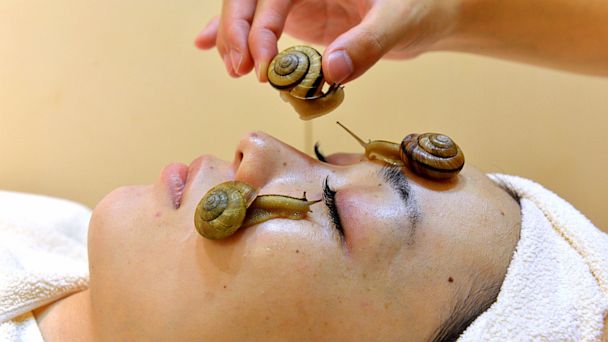Snail Facials Probably Won't Work, Dermatologists Say
A Tokyo spa is offering $243 snail facials, but dermatologists say it probably won't have lasting health benefits.
What the shell, right?
The treatment, called, "Celebrity Escargot Course," promises to help heal damaged skin and promote beauty, Yoko Minami, a sales manager at a Ci:z.Labo spa, told the Telegraph.
The newspaper's reporter said she became the first person in Japan to try the facial in which three snails were placed on her cheeks and forehead and allowed to wander around her face, leaving mucus-y goo in their wake.
Have a skin question? Try our topic page.
"This clearly is not very scientifically done," said dermatologist Dr. Stephen Mandy, who works in Miami Beach, Fla., noting that the snail facial therapy session involves a message, a mask and electrical pulse machines, making it difficult to tell which one is benefiting the client. "It kind of reminds me of the fish pedicures."
The goo is supposedly packed with "a beauty-boosting cocktail of proteins, antioxidants and hyaluronic acid," according to the Telegraph.
But Mandy, a member of the American Academy of Dermatology, said there isn't much proof it will work.
Read about a woman who was burned by her facial.
Hyaluronic acid, or hyaluronan, is a molecule found in humans that gives tissue its flexibility and promotes healing. Dermatologists use it as a filler to plump the skin and minimize the appearance of wrinkles.
Last month, researchers at the University of Rochester wrote that naked mole rats' super-long hyaluronan molecule actually tells cells to stop reproducing, which is why they think naked mole rats don't get cancer.
Read more about naked mole rats' cancer-proof goo.
But it's not clear how long the snail's hyaluronan molecules are, said University of Rochester biology professor Vera Gorbunova, so she's not sure they might work.
Even if it could work as a filler, it wouldn't make it through the outer layer of the skin without an injection, fractional lasers, microdermabrasion or electrical gradients, Mandy said. Only fat-soluble molecules and lipids can make it through that outer barrier.
Dr. William Stebbins, a dermatology professor at Vanderbilt University Medical Center, said the snails might temporarily make skin look nice but, again, the hyaluronan would likely just sit on top of the skin.
"I'd be surprised if this has any lasting effect on skin health," Stebbins said.
The salon said its snails were fed organic vegetables and kept clean, but Mandy said it's possible their slime could trigger allergic reactions in unsuspecting customers.
So what can you do instead? Dermatologists said the best way to get great skin without an abrasive procedure is to moisturize and apply sunscreen.
Read the answers to 15 common sunscreen questions.
The snail facial is only available in Japan from Ci:z:Labo, which operates a clinic and makes beauty products in Japan, but is called called Dr. Ci:Labo in the United States.
Shima Becker, who works for the company's U.S. office, said the company also sells a snail cream that is popular in Japan, but it is not available in the United States.
No one in the U.S. office was available to discuss the benefits of the snail facial or cream, she said.

(Credit: Yoshikazu Tsuno/AFP/Getty Images)